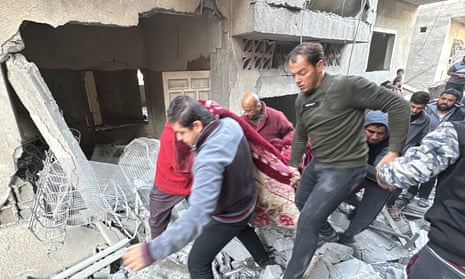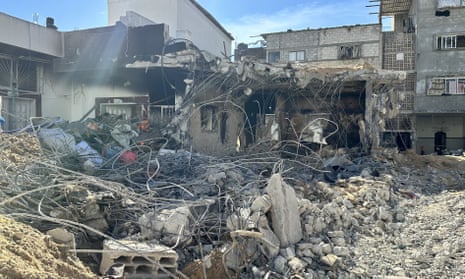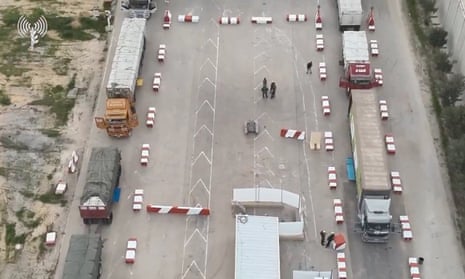UN security council to vote on ceasefire call
The United Nations security council will vote on Monday on a new resolution calling for an “urgent and sustainable cessation of hostilities” in Gaza, as Washington shows growing impatience with key ally Israel.
Agence France-Presse reports that the vote comes days after the US blocked a previous security council resolution that would have called for a “humanitarian ceasefire” in the battered Palestinian territory. But in the general assembly, the UN’s 193 members voted overwhelmingly for a ceasefire, with 153 in favour.
The coming security council resolution was introduced by Arab countries that had come away from last Tuesday’s general assembly vote bolstered by such broad international support, though the latest text’s fate remains uncertain.
The new draft, drawn up by the United Arab Emirates, calls for an “urgent and sustainable cessation of hostilities to allow safe and unhindered humanitarian access in the Gaza Strip”.
It also affirms support for a two-state solution in the region and “stresses the importance of unifying the Gaza Strip with the West Bank under the Palestinian Authority”.
In a move criticised by Israel and the US, the draft does not explicitly name Hamas, though it does call for the “immediate and unconditional release of all hostages” and condemns “all indiscriminate attacks against civilians”.
The security council has faced sharp international criticism as it has passed only one resolution on Gaza since the start of the war, in which the 15-member body called for “humanitarian pauses”, after five other resolutions were rejected, including two because of US vetoes.
According to diplomatic sources, negotiations on the new text continued on Sunday in an effort to avoid another impasse, days after US president Joe Biden warned that Israel was at risk of losing international support due to its “indiscriminate” bombing of Gaza.
Key events
Opening summary
Hello and welcome to our rolling live coverage of the Israel-Gaza war. I’m Adam Fulton and I’ll be with you for the next couple of hours.
Israeli forces launched attacks up and down the Gaza Strip on Sunday, killing at least 130 people as a refugee camp in the north and a hospital in the south were hit, according to Palestinian officials, media and eyewitnesses.
A teenage girl who had lost her leg in an earlier strike was among the dead.
Israeli strikes on the Jabalia refugee camp in northern Gaza killed 90 Palestinians on Sunday, the Hamas-run Gaza health ministry said. Another missile attack on a house belonging to the Shehab family killed 24 people, Hamas Aqsa radio said.
In central Gaza, medics said 12 Palestinians had been killed and dozens wounded in Deir al-Balah, while in Rafah in the south an Israeli airstrike on a house left at least four people dead.

Meanwhile, the United Nations security council will vote on Monday on a new resolution calling for an “urgent and sustainable cessation of hostilities” in Gaza, as Washington exhibits growing impatience Israel, its key ally Israel.
The vote comes days after the US blocked a previous security council resolution that would have called for a “humanitarian ceasefire” in Palestinian territory.
More on those stories soon. In other key developments:
-
The World Health Organization (WHO) has said it is “appalled” after Israel’s deadly raid on northern Gaza’s Kamal Adwan hospital at the weekend. WHO chief Tedros Ghebreyesus said the “effective destruction” of the hospital over the past several days was “rendering it non-functional and resulting in the death of at least eight patients”.

-
The Israeli army has said it uncovered the biggest Hamas tunnel in the Gaza Strip so far, just a few hundred metres from a key border crossing. Such was its size that small vehicles would be able to travel within it, an AFP photographer granted access to it reported. The underground passage formed part of a wider branching network that stretched for more than 2.5 miles (4km) and came within 400 metres of the Erez border crossing, the army said. It would have cost millions of dollars and taken years to construct, Israeli forces said.
-
The United Nations security council could vote as early as Monday on a proposal to demand that Israel and Hamas allow aid access to Gaza – via land, sea and air routes – and set up UN monitoring of the humanitarian assistance delivered. Diplomats said the fate of the draft security council resolution hinges on final negotiations between Israel ally the US, which has council veto power, and the United Arab Emirates, which has drafted the text.
-
The Syrian army has said Israeli missiles launched from the occupied Golan Heights hit sites near Damascus that regional intelligences say targeted Iranian militias’ stronghold near Syria’s holiest Shia Muslim shrine. Syria’s air defences shot down some of the missiles that targeted the countryside around the capital in an incident that injured two soldiers, the army said in a statement on Sunday.
-
The Kerem Shalom crossing between Israel and Gaza opened on Sunday for aid trucks for the first time since the outbreak of war, officials said, in a move intended to double the amount of food and medicine reaching the territory. Two sources in the Egyptian Red Crescent said trucks had crossed Kerem Shalom on Sunday on their way into Gaza. One said there were 79 trucks.

-
The Palestinian health ministry in the occupied West Bank is calling for an international investigation into reports that Israeli forces buried Palestinians alive in the courtyard of Gaza’s Kamal Adwan hospital using bulldozers amid its deadly raid over the weekend. Palestinian health minister Mai Alkaila cited reports from witnesses who said they saw the Israeli actions in one of the few remaining functioning hospitals in Gaza, Palestinian news agency Wafa reported. The Guardian could not confirm the reports and Israel had not responded to them.
-
France said that one of its workers was killed by an Israeli attack in Rafah. According to French foreign minister Catherine Colonna, speaking after a visit to Israel and the West Bank, the man killed was a Palestinian national who worked for the French Institute for decades.
-
The director of Israeli spy agency Mossad has met the Qatari prime minister for talks on resuming indirect negotiations on the release of hostages, CNN has reported, quoting diplomatic sources. The sources said the meeting on Friday between David Barnea and Sheikh Mohammed bin Abdulrahman bin Jassim al-Thani was positive, the network said. Reuters has quoted two Egyptian security sources as saying Israel and Hamas are both open to a renewed deal involving a ceasefire and hostage release, although disagreements on detail remain. They said Hamas was insisting on setting the list of hostages to be released unilaterally and demanding Israel withdraw its forces behind pre-determined lines.
-
Former UK defence secretary Ben Wallace has warned Israel that it risks undermining the legal basis for its action in the Gaza Strip, adding to growing international pressure over the escalating conflict. Writing for Britain’s Telegraph, the senior Tory warned against a “killing rage” and said Israel’s “original legal authority of self-defence is being undermined by its own actions”.
-
The US is to announce the launch of an expanded maritime protection force involving Arab states to combat the increasingly frequent Houthi attacks being mounted from Yemen’s ports on commercial shipping in the Red Sea. The force is due to be announced by the defence secretary, Lloyd Austin, during his Middle East visit. Five big shipping companies have now stopped their ships using the Red Sea in the wake of attacks mounted by Houthis in protest at Israel’s efforts to eliminate Hamas in Gaza.
-
The head of the UN agency for Palestinian refugees (UNRWA) has said of the humanitarian crisis in Gaza: “By any account, I haven’t seen anything of this scale.” Philippe Lazzarini went on to say in an interview with Al Jazeera: “Everything is absolutely unprecedented and staggering. The number of people who have been killed … in 40 days, more women and children killed than the number of civilians in the Ukraine war.”

